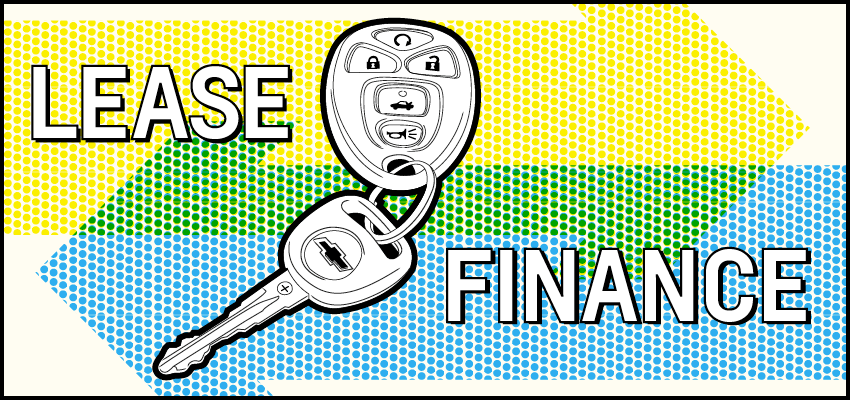Should I Lease My Next Vehicle?

Leasing offers some significant benefits over financing or paying cash, but to really know the answer to that age old question “Should I lease my next vehicle?”, here are a few frequently asked questions that might help you to make an informed decision:
Can I walk away at the end of my lease?
Yes, you can definitely walk away at the end if you have chosen the right type of lease. Make sure you are selecting a closed ended lease. This would be the type of lease that most manufacturers including General Motors offer. Your lease is based on a pre-set amount of annual mileage with a standard allowance for wear and tear. You have the ability to purchase additional mileage if you drive more than the average car owner. Providing your car is within the mileage allowance built into your lease and does not have excessive wear and tear, you can turn your keys in and walk away with no additional charges.
I drive too much, can I still lease?
Believe it or not, leasing can actually be more beneficial for a high-miler. The one thing that is consistent for all different types of car ownership is depreciation. It doesn’t matter how you paid for your car if you have a 2 year old car with 60,000 kilometres on it, it is worth the same amount whether you financed, leased or paid cash. Leasing can actually allow you to control the amount of depreciation you are responsible for. If you finance or paid cash for your vehicle, you assume all of the depreciation yourself.

Are interest rates higher on a lease?
With leasing becoming a very popular purchasing option again, lease rates have become very attractive! GM is currently offering a 0% Lease rate on many of their “core” vehicles including Cruze, Trax, Equinox and Traverse. This combined with strong residual values provide very attractive payment options.
What happens if I am in an accident with my leased car?
Unfortunately, whether you lease, finance or pay cash for your car, accidents happen. Leasing can actually provide you with the best shelter in the event of excessive damage claims or total loss. In the worst case, should your vehicle be declared a total loss, GM leases provide you with GAP protection that will cover the “gap” between the amount you owe on the lease and the market value of your car. In the full disclosure world we live in now, a damage claim on your vehicle will always be disclosed in the form of a Carproof report. In the event that you were trading a vehicle in, that report would have an impact on the value of the car and could cause significant additional depreciation. If you had leased the vehicle, you would still have the ability to turn the keys in and walk away assuming the vehicle still met the lease end mileage and were and tear obligations.
Can I get out of my lease?
There is a misconception that getting out of a lease is difficult making leasing very unattractive. In reality, getting out of a financed vehicle is often much more difficult as the depreciation and negative equity falls on the owner. Most leasing companies provide lease-transfer options that allow you to find someone to assume your lease. There are often people that are looking for very short term leases to match job contracts or short term vehicle needs. This transfer process may allow you to get out of your lease with little or no out of pocket expense.
Why lease if I want to own my car?
Statistics show today that very few people actually pay cash for their vehicle. This is really the ONLY way you can truly own your vehicle. With many lenders and manufacturers offering extended amortization up to 72, 84 and even 96 months, many customers are put into a negative equity situation and will likely trade out of their vehicle long before they have a chance to experience true ownership.
What are the benefits of leasing?
Leasing provides a number of benefits that are designed to allow you to be in control of your vehicle experience. Here a few benefits:
Lower out of pocket expense: Leases require little or no down payment, and there are no upfront sales tax payments. Additionally, monthly payments are usually lower, and you get the pleasure of owning a new car every few years.
Minimize your depreciation: With a lease, you pay a pre-set amount of depreciation over the term of your lease. If the vehicle depreciates more than expected, the leasing company assumes the additional expense in a closed ended lease.
Avoiding excessive maintenance expenses: Leasing provides you an opportunity to select terms that match the manufacturer’s factory warranty and with some brands; they may even have maintenance plans that cover you for your regular vehicle servicing. With any vehicle, regular maintenance is required to keep the factory warranty intact. Leasing does not require any additional vehicle servicing over and above the regular maintenance schedule.
When you are making a decision about whether to finance or lease, make sure your sales consultant provides you with a lease/finance comparison including factory incentives, equal up-front expenses and payment terms. Often manufactures will provide incentives on lease or finance but not always both. A fair comparison will allow you to make sure you are taking advantage of the best purchase incentives.

